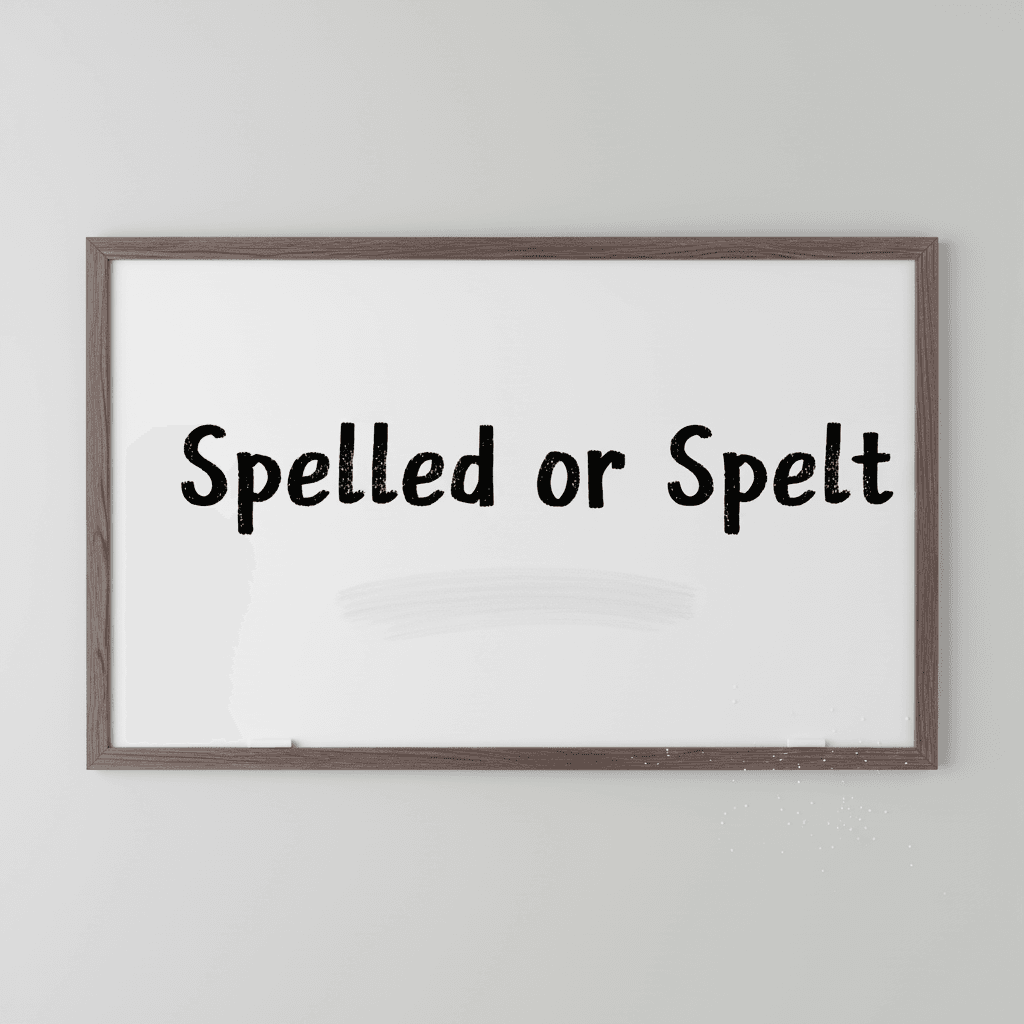Spelled vs. Spelt: What’s the Difference?
 Both spelled and spelt are past tense and past participle forms of the verb spell.
Both spelled and spelt are past tense and past participle forms of the verb spell.
They mean to write or name the letters of a word in the correct order.
The difference depends on where you are and how formal your writing is.
Here’s the short rule:
- Spelled → American English 🇺🇸 (standard everywhere)
- Spelt → British English 🇬🇧 (informal or traditional use)
1. Spelled: The Standard American Form
Meaning
“Spelled” is the regular past tense and past participle of spell in American English.
It’s also widely accepted in international business, technology, and education contexts.
Examples (10 total)
- He spelled my name wrong.
- She spelled the word correctly on her first try.
- We spelled everything out clearly.
- The teacher spelled each word slowly.
- I spelled “accommodation” with one “m.”
- They spelled the company’s name in big letters.
- He spelled trouble when he walked in.
- The word is spelled with a “u” in British English.
- She has spelled it that way her whole life.
- I’ve spelled it wrong again!
🧠 Tip:
If you’re writing for an American audience or in formal contexts, use spelled — it’s always correct.
2. Spelt: The Traditional British Form
Meaning
“Spelt” is the older, British version of the past tense and past participle of spell.
It’s still common in U.K., Australian, and New Zealand English — though spelled is also accepted.
Examples (10 total)
- He spelt his name differently in those days.
- She spelt “colour” with a “u.”
- The word was spelt incorrectly on the sign.
- I’ve never spelt it that way before.
- The name was spelt out slowly for clarity.
- He spelt the town’s name wrong on the map.
- It’s spelt “centre” in British English.
- They spelt their last name differently from ours.
- The invitation was spelt perfectly.
- I think you’ve spelt it wrong again!
🧠 Tip:
If you’re writing in British English or for U.K. audiences, you can use either spelled or spelt — both are correct.
3. Quick Comparison Table
| English Type | Correct Form | Example | Notes |
|---|---|---|---|
| American English | Spelled | He spelled it wrong. | Preferred and standard |
| British English | Spelt / Spelled | He spelt it wrong. | Both accepted; spelt more traditional |
| Formal Writing | Spelled | The name was spelled correctly. | Use “spelled” for clarity |
| Casual British Speech | Spelt | You spelt that wrong! | Common in conversation |
4. How to Remember
👉 Spelled = standard, safe everywhere.
👉 Spelt = British, older, and more casual.
💡 Memory Trick:
If you write color, use spelled.
If you write colour, use spelt.
5. Common Mistakes
❌ He spelt it wrong (in formal American English).
✅ He spelled it wrong.
❌ She spelled it wrong (in casual British English — not “wrong,” just less common).
✅ She spelt it wrong (fits casual U.K. tone).
6. Why It’s Confusing
English verbs often have two past forms — one regular (-ed) and one irregular (-t).
Examples:
- learned / learnt
- dreamed / dreamt
- burned / burnt
- spelled / spelt
Over time, American English favored -ed endings, while British English kept -t variants.
That’s why both spelled and spelt exist today.
Even AI tools like Humanizey automatically adapt spelling to your target audience — U.S. or U.K. — to ensure natural usage.
FAQs
1. Is “spelt” wrong in American English?
It’s not “wrong,” but it sounds old-fashioned or regional. Americans almost always use spelled.
2. Can I use “spelled” in British English?
Yes — it’s completely fine and often preferred in formal writing.
3. Do “spelt” and “spelled” sound different?
No — both are pronounced the same: /spɛld/.
4. Is “spelt” also a kind of grain?
Yes! Spelt is also a type of wheat used in bread and cereals — unrelated to the verb spell.
Practice: Choose the Correct Word (“Spelled” or “Spelt”)
(Answers are listed at the end.)
- She ___ the word wrong on her test.
- The company name was ___ in all capital letters.
- I’ve never ___ it that way before.
- He ___ his name slowly for the receptionist.
- The word “centre” is ___ differently in the U.K.
- The document was ___ perfectly.
- They ___ out each letter of the word.
- You ___ it wrong again!
- I think it’s ___ “favourite,” not “favorite.”
- My teacher said I ___ everything correctly.
Answers
(Use spelled for American English, spelt for British English — both are correct depending on region!)
